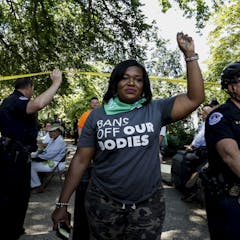
Artículos sobre Enslaved people
Mostrando todos artículos

A new archival study uncovers details about Lloyds of London’s role in the transatlantic slave trade. Whether historical or political, reparatory justice relies on such historical evidence.

In the US, white men have long had the power to make decisions about women’s reproductive health care. Those decisions have often been especially harmful to Black women.

While a Florida curriculum implies that enslaved Africans ‘benefited’ from skills acquired through slavery, history shows they brought knowledge and skills to the US that predate their captivity.

Beatrix Potter’s silence concerning her sources means the Brer Rabbit folktales that helped create her stories are passed over without acknowledgement or celebration.

Two food scientists, an entomologist, an anthropologist, a veterinarian and a historian walk into a bar (of chocolate) and tell bitter and sweet stories of this favorite treat.

By raising the Mauritian flag on the Chagos Islands, the east African nation has reasserted – if only symbolically – its claim to sovereignty.

By the time slavery ended, over 1 million enslaved people had been forcibly moved in the domestic slave trade across state lines. Hundreds of thousands more were bought and sold within states.

A scholar of race and racism explains what critical race theory is – and how many people get it wrong.

Many Americans first heard of Elizabeth City, North Carolina, when protests began after Andrew Brown Jr. was killed by sheriff’s deputies. But the city has a long history of fighting racial injustice.

When the Cherokee Supreme Court ruled that tribal elected officials no longer had to be Cherokee “by blood,” it was the latest chapter in a long-running fight over who controls tribal citizenship.

Proposed legislation would identify and protect African American cemeteries. But it wouldn’t cover the remains of thousands of Black people in museum collections.

There’s a bittersweet history to chocolate in America. At one plantation museum in Virginia, the story of enslaved chocolatier Caesar shows the oppression that lay behind the elite’s culinary treat.

For his first presidential Thanksgiving, George Washington aimed to pull his country together in the face of the many internal divisions that could yank it apart.

With a Supreme Court ruling rejecting one of the founders’ two reasons for creating the Electoral College, only one reason remains: racism.

The racist legacy of the American death penalty.

A growing chorus of people say the US has never been so politically divided. A Civil War historian reminds readers that there was once a far more divided time.
